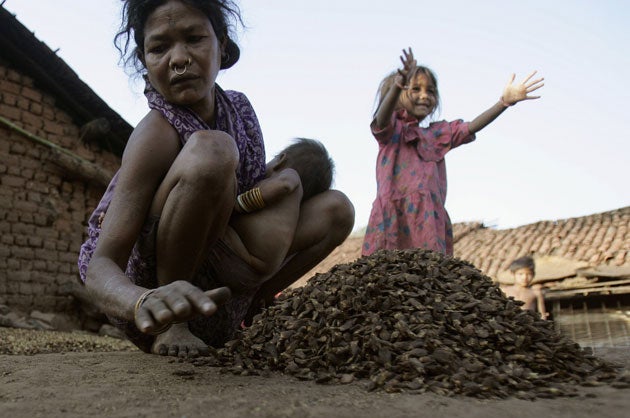Tribe wants newly elected politicians to 'keep their word'
Indian mountain people fight court decision to let a UK company mine bauxite on their ancient land

Your support helps us to tell the story
From reproductive rights to climate change to Big Tech, The Independent is on the ground when the story is developing. Whether it's investigating the financials of Elon Musk's pro-Trump PAC or producing our latest documentary, 'The A Word', which shines a light on the American women fighting for reproductive rights, we know how important it is to parse out the facts from the messaging.
At such a critical moment in US history, we need reporters on the ground. Your donation allows us to keep sending journalists to speak to both sides of the story.
The Independent is trusted by Americans across the entire political spectrum. And unlike many other quality news outlets, we choose not to lock Americans out of our reporting and analysis with paywalls. We believe quality journalism should be available to everyone, paid for by those who can afford it.
Your support makes all the difference.An Indian tribe which has lost its five-year battle to save its sacred home from destruction by a British FTSE-100 mining company earlier this month, only discovered its fate on Friday. The Dongria Kondh have been living for centuries on the remote Niyamgiri Mountain in eastern India, worshipping the hill god Niyam Raja and living off the land. But an Indian Supreme Court ruling means that Vedanta, a mining company owned by the London-based Indian billionaire Anil Agarwal, can begin mining on the mountain.
Vedanta's subsidiary, Sterlite, has been given permission to begin mining bauxite, the most important aluminium ore, on land considered sacred by the tribe. Previous studies by academics, government bodies and charities have shown that an open-pit mine would destroy the habitat that has been its home for generations, destroy the forest, and cause water sources to dry up, threatening endangered animals and ecosystems.
For the people of Niyamgiri, which is situated deep in the state of Orissa, this represents a devastating blow as they rely on the land for food, culture and medicine. Kumti Majhi, a leader for the Niyamgiri people, said: "We cannot live without our god mountain and the forest, and we will continue our peaceful struggle. It is a life and death battle and the Dongria Kondh people are united on this."
The Kondh's shock at the news that their battle is lost has been compounded by a lack of warning from the government. The tribespeople allege that until the charity ActionAid contacted them on Friday, they had no knowledge of their fate. "It has happened in a very underhand way," said Mr Majhi.
The plight of the people at Niyamgiri has been a cause célèbre among conservationists around the world for nearly half a decade. It seems now that their concern has done little to stop mining in this fragile ecosystem.
"This ruling will mean the complete destruction of the tribal groups – there's no doubt about it", said Babu Mathew, ActionAid's director in India. But he said he still held hopes that political changes following yesterday's election result could spell hope for the future. "The newly elected candidates canvassed on the fact that they would help the tribal people, so we will try and get them to keep their word."
A spokesman for Vedanta said: "This has been a long, democratic process. The Supreme Court has given its permission and identified a number of commitments for us to meet to help the community. We are very happy to go ahead with the project on that basis."
Join our commenting forum
Join thought-provoking conversations, follow other Independent readers and see their replies
Comments